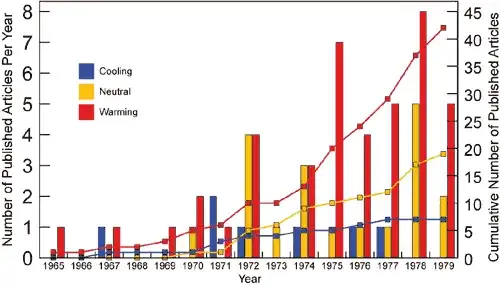In a word, no.
I could cite sources, but William Connolley has already exhaustively researched this (summary here), including Rasool and Schneider. Nothing in your question implies that he has incorrectly characterized the prevailing scientific views at the time.
Connolley cites a 1975 NAS report as more representative of the scientific (not media) consensus of the time. You can read the forward here. This report notes that scientists were not confident in their ability to predict climate trends back then:
Unfortunately, we do not have a good quantitative understanding of our climate machine and what determines it's course. Without this fundamental understanding, it does not seem possible to predict climate-neither in short-term variations nor in any in its larger long-term changes.
The paper you cite is one assertion that "global cooling" is possible. It is not a consensus. One or two assertions don't make a consensus, especially a paper like Rasool and Schneider, which is riddled with flaws. There appear to have been other scientists with similar concerns, and perhaps fewer analytic errors in their work, as well, but again, a handful of people don't make a "consensus."
Cherry picking one or two examples which happen to run against the prevailing scientific views at the time -- which were, in short, that climatologists in 1975 were not confident in their ability to predict climate changes at all -- in no way suggests any kind of consensus. There is no credible claim of a consensus for global cooling in your question, only a dodgy paper and an unsupported assertion.
Connolley's own conclusion, from reading the papers cited, is as follows:
Finally, its clear that there were concerns, perhaps quite strong, in the minds of a number of scientists of the time. And yet, the papers of the time present a clear consensus that future climate change could not be predicted with the knowledge then available. Apparently, the peer review and editing process involved in scientific publication was sufficient to provide a sober view. This episode shows the scientific press in a very good light; and a clear contrast to the lack of any such process in the popular press, then and now.
Regarding your partial-sentence quote from Peterson, Connolley, and Fleck, let's look at the whole sentence, in context:
Indeed, the Earth appeared to have been cooling for more than 2 decades when scientists first took note of the change in trend in the 1960s. The seminal work was done by J. Murray Mitchell [in 1963, showing that] global temperatures had increased fairly steadily from the 1880s, the start of his record, until about 1940, before the start of a steady multidecade cooling (Mitchell 1963). By the early 1970s, when Mitchell updated his work (Mitchell 1972), the notion of a global cooling trend was widely accepted, albeit poorly understood.
It is quite clear, in context, that this refers to the post-1940s cooling rather than to supposed predictions of a new ice age. Today it is understood that this (ultimately temporary) drop was due to aerosols and industrial pollution and was mainly a Northern Hemisphere, rather than a global trend. But yes, it's correct to say that scientists in the seventies agreed that there was cooling from the 40s through the early 70s, and, with the caveats noted above, they still do.
